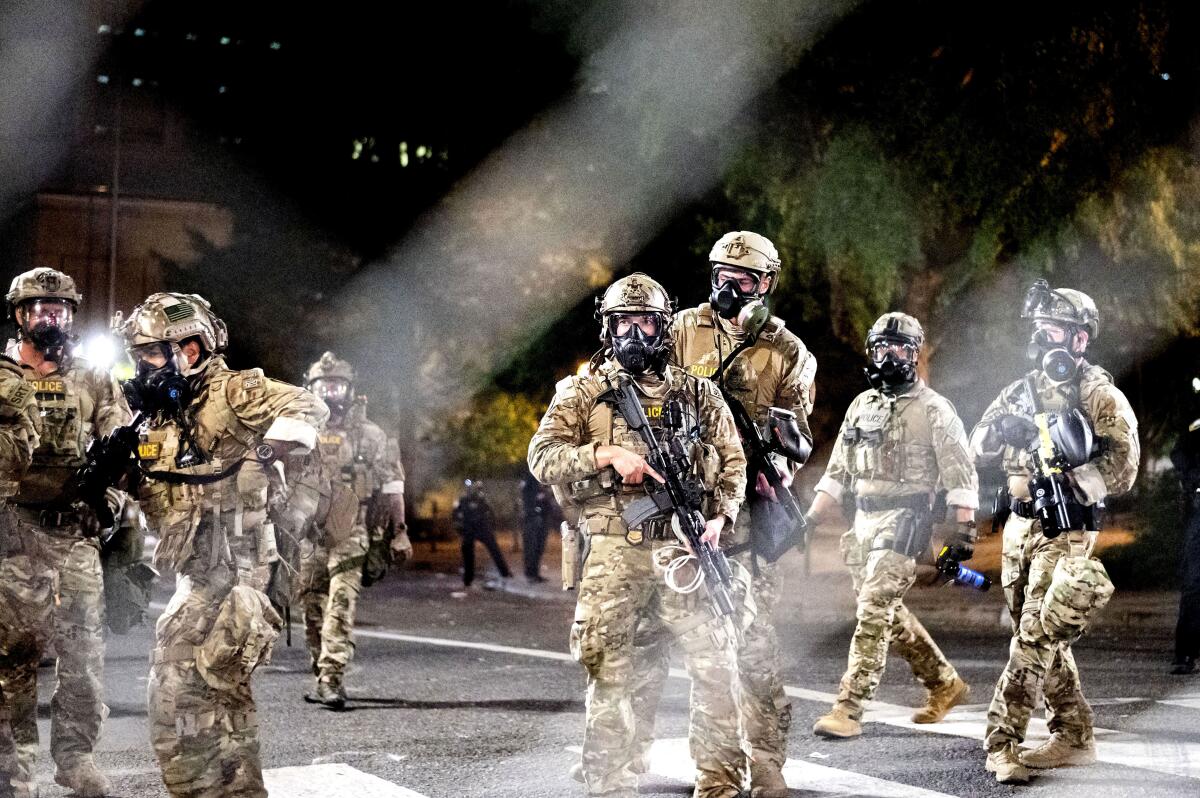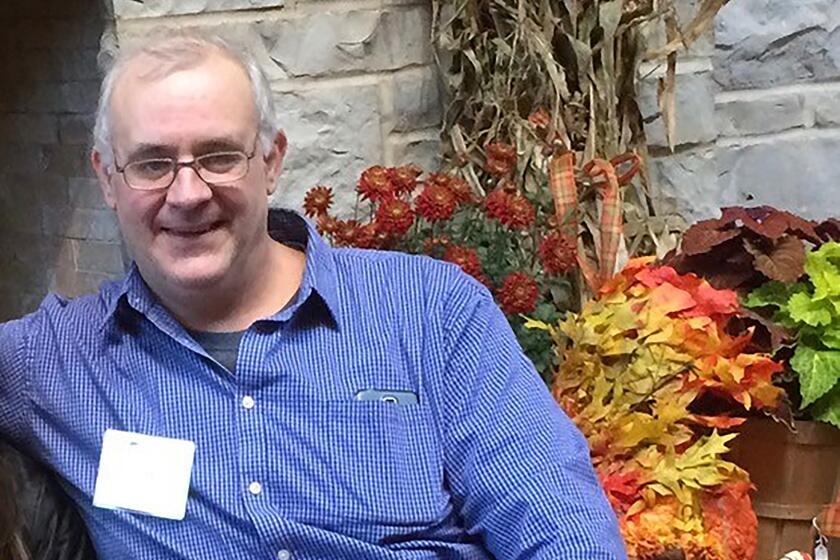150 federal agents set to deploy in Chicago as Trump talks of targeting more cities

- Share via
CHICAGO — The U.S. Department of Homeland Security is crafting plans to deploy about 150 federal agents to Chicago this week, the Chicago Tribune has learned, a move that would come amid growing controversy nationally about federal force being used in American cities.
The Homeland Security Investigations, or HSI, agents are set to assist other federal law enforcement and Chicago police in crime-fighting efforts, according to sources familiar with the matter, though a specific plan on what the agents would be doing had not been made public.
One city official said the city was aware of the plan but not any specifics. The Department of Justice and Homeland Security in Washington did not immediately respond to requests for comment.
One Immigration and Customs Enforcement official in Chicago, who asked not to be named because they were not authorized to speak on the matter, confirmed the deployment was expected to take place. The official noted that the HSI agents, who are part of ICE, would not be involved in immigration or deportation matters.
It was unclear where all the agents would be coming from, though many were expected to be from agencies operating in the Chicago area. Questions remained about the chain of command.
The Chicago Police Department issued a statement Monday.
“The Chicago Police Department does not maintain any authority over the federal government’s deployment of federal law enforcement agents to the city of Chicago. We regularly work alongside our local and federal law enforcement agency partners toward the common goal of keeping Chicago residents safe,” the statement read. “If federal agents are deployed, it is critical that they coordinate with the Chicago Police Department and work alongside us to fight violent crime in Chicago.”
An iconic image has emerged on Twitter since early Saturday morning in Portland, when a woman wearing nothing but a mask and cap strode toward federal agents as they fired tear gas at protesters — a surreal image of human vulnerability in the face of an overpowering force.
The use of federal agents to confront street protesters in Portland, Ore., has raised alarm in many circles. Chicago, too, has dealt with protests that have led to injuries in recent days.
At an unrelated news conference Monday morning, Mayor Lori Lightfoot said she had great concerns about the general possibility of President Trump sending federal agents to Chicago based on what had happened in Portland, Ore.
If Trump wants to help, she said, he could boost federal Bureau of Alcohol, Tobacco, Firearms and Explosives resources and fully fund prosecutors.
“We don’t need federal agents without any insignia taking people off the streets and holding them, I think, unlawfully,” Lightfoot said.
Later Monday, Lightfoot sent a four-page letter to Trump saying that, despite his “misplaced and incendiary rhetoric,” she will take him at his word that he wants to help Chicago.
And if that’s so, she said, the city needs gun safety reforms and investigations of illegal sales, more spending on community-based outreach and development in disinvested South and West Side neighborhoods.
“These acts will deliver on your promise to make Chicagoans safer — not derision, mandates or militarized forces,” Lightfoot said.
Word of the Chicago plan came after Trump last week made a vague announcement on how his administration intended to deal with crime in big U.S. cities such as Chicago. The Republican president, who has been very critical of violence in Chicago throughout his term, has been pushing a “law and order” message as he enters the final stretch of his reelection campaign against his presumptive Democratic challenger, former Vice President Joe Biden.
Trump alluded to the same issue in an interview with “Fox News Sunday” host Chris Wallace, calling Chicago and New York “stupidly run” cities and blaming the violent crime there on Lightfoot and New York Mayor Bill de Blasio.
He repeated his pledge at the White House on Monday, and linked the effort to Portland.
“I’m going to do something, that I can tell you, because we’re not going to leave New York and Chicago and Philadelphia, Detroit and Baltimore, and all of these — Oakland is a mess. We’re not going to let this happen in our country, all run by liberal Democrats,” Trump said, talking about violence in those places, and then mentioning Portland.
“We’re going to have more federal law enforcement, that I can tell you,” he said. “In Portland, they’ve done a fantastic job. They’ve been there three days and they really have done a fantastic job in a very short period of time, no problem.”
A 53-year-old Navy veteran was beaten with a baton swung with both hands by a federal officer during protests in Portland, Ore.
Lightfoot pushed back last week on criticism from Trump’s press secretary, saying the Trump administration is trying to put the blame on Democrats for political purposes to “score points with their base.”
Without offering specifics, White House Chief of Staff Mark Meadows told Fox News over the weekend that Trump, Atty. Gen. William Barr and acting Homeland Security Secretary Chad Wolf would roll out a plan this week for tamping down crime in various U.S. cities.
“Some of the unrest that we saw, even in the last month or so, but particularly last night and in the week leading up to it in Portland, is just not acceptable when you look at communities not being safe and not upholding the rule of law,” said Meadows. “So, Atty. Gen. Barr is weighing in on that with Secretary Wolf, and you’ll see something rolled out this week as we start to go in and make sure that the communities, whether it’s Chicago or Portland or Milwaukee or someplace across the heartland of the country, we need to make sure their communities are safe.”
As news of the plans spread, leaders of the American Civil Liberties Union of Illinois issued a strongly worded statement opposing the move.
“Make no mistake: Trump’s unmarked federal forces will not assist in constructively addressing violence in Chicago,” Colleen Connell, executive director of the group, said in the statement. “As our colleagues have seen in Portland, Trump’s secret forces will terrorize communities, and create chaos. This is not law and order. This is an assault on the people of this country, the specific protections of protest and press in the 1st Amendment, and the Constitution’s assignment of policing to local authorities, not a president acting like a despot.”
On Saturday, the president of the Chicago police’s largest union sent Trump a letter asking for help from the federal government in putting a lid on crime in the city.
“I am certain you are aware of the chaos currently affecting our city on a regular basis now,” John Catanzara, president of the Fraternal Order of Police Lodge 7, wrote in a letter that was posted on the FOP’s Facebook page. “I am writing to formally ask you for help from the federal government. Mayor Lightfoot has proved to be a complete failure who is either unwilling or unable to maintain law and order here.”
So far in 2020, Chicago has experienced one of its most violent years in recent memory, especially since late May with the fallout over the death of George Floyd at the hands of police in Minnesota. Through July 12, homicides in Chicago were up 48%, to 385, compared with 260 at the same time last year, official CPD statistics show. Shootings were also up 46%.
During a 28-day period through July 12, 116 people were slain in Chicago, the statistics show. That’s up from 41 during the same period in 2019.
In addition to Portland, Homeland Security agents have already been sent to other cities, including Washington and Seattle.
Oregon’s attorney general sued Homeland Security and the U.S. Marshals Service on Friday, alleging in a complaint that federal agents in Portland, which has continued to see intense unrest since Floyd’s death on May 25, unjustifiably grabbed people from the city’s streets.
More to Read
Sign up for Essential California
The most important California stories and recommendations in your inbox every morning.
You may occasionally receive promotional content from the Los Angeles Times.











